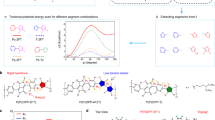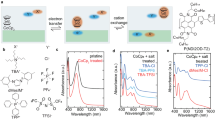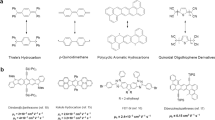Abstract
Molecular doping has emerged as a powerful strategy to tune the charge transport and mechanical properties of polymer semiconductors. However, the lack of structural diversity among dopants often limits the potential to improve both mobility and stretchability. Herein, we report a rationally designed Lewis acid dopant, i.e., branched octyloxy borane (BOB), which incorporates π-conjugated segments and branched alkoxy side chains to modulate polymer aggregation and crystallinity. When applied to a brittle diketopyrrolopyrrole-based polymer, BOB induces moderate p-type doping while suppressing long-range crystallinity in the solid state. At 1 wt% doping, the films show a 5-fold increase in crack onset strain (from 20 to 100%) and maintain a high mobility of 1.02 cm2 V–1 s–1. The films retain more than 30% of their initial mobility at 100% strain and show excellent stability under repeated mechanical deformation. These findings provide insights into dopant‒polymer interactions and offer molecular design principles for dopants aimed at increasing the stretchability of polymer semiconductors.
This is a preview of subscription content, access via your institution
Access options
Subscribe to this journal
Receive 12 print issues and online access
$259.00 per year
only $21.58 per issue
Buy this article
- Purchase on SpringerLink
- Instant access to the full article PDF.
USD 39.95
Prices may be subject to local taxes which are calculated during checkout







Similar content being viewed by others
References
Zheng Y, Wang G-JN, Kang J, Nikolka M, Wu H-C, Tran H, et al. An intrinsically stretchable high-performance polymer semiconductor with low crystallinity. Adv Funct Mater. 2019;29:1905340 https://doi.org/10.1002/adfm.201905340.
Yu X, Chen L, Li C, Gao C, Xue X, Zhang X, et al. Intrinsically stretchable polymer semiconductors with good ductility and high charge mobility through reducing the central symmetry of the conjugated backbone units. Adv Mater. 2023;35:2209896. https://doi.org/10.1002/adma.202209896.
Chen AX, Kleinschmidt AT, Choudhary K, Lipomi DJ. Beyond stretchability: strength, toughness, and elastic range in semiconducting polymers. Chem Mater. 2020;32:7582 https://doi.org/10.1021/acs.chemmater.0c03019.
Trung TQ, Lee N-E. Recent progress on stretchable electronic devices with intrinsically stretchable components. Adv Mater. 2017;29:1603167. https://doi.org/10.1002/adma.201603167.
Wang X, Dong L, Zhang H, Yu R, Pan C, Wang ZL. Recent progress in electronic skin. Adv Sci. 2015;2:1500169. https://doi.org/10.1002/advs.201500169.
Kim D-H, Rogers JA. Stretchable electronics: materials strategies and devices. Adv Mater. 2008;20:4887 https://doi.org/10.1002/adma.200801788.
Liu D, Mun J, Chen G, Schuster NJ, Wang W, Zheng Y, et al. A design strategy for intrinsically stretchable high-performance polymer semiconductors: incorporating conjugated rigid fused-rings with bulky side groups. J Am Chem Soc. 2021;143:11679 https://doi.org/10.1021/jacs.1c04984.
Yang JC, Mun J, Kwon SY, Park S, Bao Z, Park S. Electronic skin: recent progress and future prospects for skin-attachable devices for health monitoring, robotics, and prosthetics. Adv Mater. 2019;31:1904765. https://doi.org/10.1002/adma.201904765.
Wang S, Oh JY, Xu J, Tran H, Bao Z. Skin-inspired electronics: an emerging paradigm. Acc Chem Res. 2018;51:1033 https://doi.org/10.1021/acs.accounts.8b00015.
Lin Y-C, Chen F-H, Chiang Y-C, Chueh C-C, Chen W-C. Asymmetric side-chain engineering of isoindigo-based polymers for improved stretchability and applications in field-effect transistors. ACS Appl Mater Interfaces. 2019;11:34158 https://doi.org/10.1021/acsami.9b10943.
Liu D, Lei Y, Ji X, Wu Y, Lin Y, Wang Y, et al. Tuning the mechanical and electric properties of conjugated polymer semiconductors: side-chain design based on asymmetric benzodithiophene building blocks. Adv Funct Mater. 2022;32:2203527 https://doi.org/10.1002/adfm.202203527.
Ding Y, Yuan Y, Wu N, Wang X, Zhang G, Qiu L. Intrinsically stretchable n-type polymer semiconductors through side chain engineering. Macromolecules. 2021;54:8849 https://doi.org/10.1021/acs.macromol.1c00936.
Chang T-W, Weng Y-C, Tsai Y-T, Jiang Y, Matsuhisa N, Shih C-C. Chain-Kinked design: improving stretchability of polymer semiconductors through nonlinear conjugated linkers. ACS Appl Mater Interfaces. 2023;15:51507 https://doi.org/10.1021/acsami.3c10033.
Lin Y-C, Huang Y-W, Hung C-C, Chiang Y-C, Chen C-K, Hsu L-C, et al. Backbone engineering of diketopyrrolopyrrole-based conjugated polymers through random terpolymerization for improved mobility-stretchability property. ACS Appl Mater Interfaces. 2020;12:50648 https://doi.org/10.1021/acsami.0c14592.
Zhu M, Shao Z, Li Y, Xiong Z, Yang Z, Chen J, et al. Molecular-scale geometric design: zigzag-structured intrinsically stretchable polymer semiconductors. J Am Chem Soc. 2024;146:27429 https://doi.org/10.1021/jacs.4c07174.
Higashihara T. Strategic design and synthesis of π-conjugated polymers suitable as intrinsically stretchable semiconducting materials. Polym J. 2021;53:1061 https://doi.org/10.1038/s41428-021-00510-1.
Onorato J, Pakhnyuk V, Luscombe CK. Structure and design of polymers for durable, stretchable organic electronics. Polym J. 2017;49:41–60. https://doi.org/10.1038/pj.2016.76.
Mun J, Kang J, Zheng Y, Luo S, Wu Y, Gong H, et al. F4-TCNQ as an additive to impart stretchable semiconductors with high mobility and stability. Adv Electron Mater. 2020;6:2000251 https://doi.org/10.1002/aelm.202000251.
Tang K, Shaw A, Upreti S, Zhao H, Wang Y, Mason GT, et al. Impact of sequential chemical doping on the thin film mechanical properties of conjugated polymers. Chem Mater. 2025;37:756 https://doi.org/10.1021/acs.chemmater.4c03120.
Kim J, Ju D, Kim S, Cho K. Disorder-controlled efficient doping of conjugated polymers for high-performance organic thermoelectrics. Adv Funct Mater. 2024;34:2309156. https://doi.org/10.1002/adfm.202309156.
Karpov Y, Erdmann T, Stamm M, Lappan U, Guskova O, Malanin M, et al. Molecular doping of a high mobility diketopyrrolopyrrole-dithienylthieno[3,2-b]thiophene donor-acceptor copolymer with F6TCNNQ. Macromolecules. 2017;50:914 https://doi.org/10.1021/acs.macromol.6b02452.
Yan H, Ma W. Molecular doping efficiency in organic semiconductors: fundamental principle and promotion strategy. Adv Funct Mater. 2022;32:2111351. https://doi.org/10.1002/adfm.202111351.
Ke Z, Chaudhary J, Flagg LQ, Baustert KN, Yusuf AO, Liu G, et al. Controlled dedoping and redoping of N-doped poly(benzodifurandione) (n-PBDF). Adv Funct Mater. 2024;34:2400255. https://doi.org/10.1002/adfm.202400255.
Jacobs IE, Wang F, Hafezi N, Medina-Plaza C, Harrelson TF, Li J, et al. Quantitative dedoping of conductive polymers. Chem Mater. 2017;29:832 https://doi.org/10.1021/acs.chemmater.6b04880.
Wang X, Huang H, Gu K, Wang Y, Zhu C, Gu X, et al. Modulating aggregation structure and properties of conjugated polymers via ester additives. Macromolecules. 2024;57:7586 https://doi.org/10.1021/acs.macromol.4c00576.
Weng Y-C, Kang C-C, Chang T-W, Tsai Y-T, Khan S, Hung T-M, et al. Design principles for enhancing both carrier mobility and stretchability in polymer semiconductors via Lewis acid doping. Adv Mater. 2025;37:2411572. https://doi.org/10.1002/adma.202411572.
Yurash B, Cao DX, Brus VV, Leifert D, Wang M, Dixon A, et al. Towards understanding the doping mechanism of organic semiconductors by Lewis acids. Nat Mater. 2019;18:1327–1334. https://doi.org/10.1038/s41563-019-0479-0.
Ghamari P, Niazi MR, Perepichka DF. Controlling structural and energetic disorder in high-mobility polymer semiconductors via doping with nitroaromatics. Chem Mater. 2021;33:2937 https://doi.org/10.1021/acs.chemmater.1c00448.
Liu Y, Zhao B, Liu J, Wang Z, Liang Z, Dong W, et al. Extending the p-doping of polymers to an air stable Lewis acid-base adduct by increasing the acidity of the dopant. ACS Appl Polym Mater. 2022;4:3877 https://doi.org/10.1021/acsapm.2c00342.
Wang Y, Gao Y, Cao S, Wang Z, Xu M, Chen H, et al. Mitigating dark current and improving charge collection for high-performance near-infrared organic photodiodes via p-doping strategy. Chem Eng J. 2024;488:151044. https://doi.org/10.1016/j.cej.2024.151044.
Sarkar T, Schneider SA, Ankonina G, Hendsbee AD, Li Y, Toney MF, et al. Tuning Intra and Intermolecular Interactions for Balanced Hole and Electron Transport in Semiconducting Polymers. Chem Mater. 2020;32:7338 https://doi.org/10.1021/acs.chemmater.0c02199.
Lüssem B, Keum C-M, Kasemann D, Naab B, Bao Z, Leo K. Doped organic transistors. Chem Rev. 2016;116:13714 https://doi.org/10.1021/acs.chemrev.6b00329.
Xu J, Wu H-C, Mun J, Ning R, Wang W, Wang G-JN, et al. Tuning conjugated polymer chain packing for stretchable semiconductors. Adv Mater. 2022;34:2104747 https://doi.org/10.1002/adma.202104747.
Cheng H-W, Zhang S, Michalek L, Ji X, Luo S, Cooper CB, et al. Realizing intrinsically stretchable semiconducting polymer films by nontoxic additives. ACS Mater Lett. 2022;4:2328 https://doi.org/10.1021/acsmaterialslett.2c00749.
Mun J, Ochiai Y, Wang W, Zheng Y, Zheng Y-Q, Wu H-C, et al. A design strategy for high mobility stretchable polymer semiconductors. Nat Commun. 2021;12:3572. https://doi.org/10.1038/s41467-021-23798-2.
Zhang S, Ocheje MU, Huang L, Galuska L, Cao Z, Luo S, et al. The critical role of electron-donating thiophene groups on the mechanical and thermal properties of donor-acceptor semiconducting polymers. Adv Electron Mater. 2019;5:1800899. https://doi.org/10.1002/aelm.201800899.
Acknowledgements
This work was financially supported by the National Science and Technology Council in Taiwan (NSTC 113-2628-E-224-001). The authors gratefully acknowledge the use of NMR005000 belonging to the Core Facility Center of National Cheng Kung University.
Author information
Authors and Affiliations
Corresponding author
Ethics declarations
Conflict of interest
The authors declare no competing interests.
Additional information
Publisher’s note Springer Nature remains neutral with regard to jurisdictional claims in published maps and institutional affiliations.
Supplementary information
Rights and permissions
Springer Nature or its licensor (e.g. a society or other partner) holds exclusive rights to this article under a publishing agreement with the author(s) or other rightsholder(s); author self-archiving of the accepted manuscript version of this article is solely governed by the terms of such publishing agreement and applicable law.
About this article
Cite this article
Hung, TM., Kang, CC., Lu, TC. et al. Tailoring aggregation behavior and crystalline structure of stretchable polymer semiconductors via a novel Lewis acid dopant. Polym J 57, 1227–1237 (2025). https://doi.org/10.1038/s41428-025-01080-2
Received:
Revised:
Accepted:
Published:
Version of record:
Issue date:
DOI: https://doi.org/10.1038/s41428-025-01080-2



